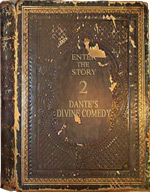
The poet tells in the first person his travel through the three realms of the dead, lasting during the Easter Triduum in the spring of 1300. Dante Alighieri’s Divine Comedy is considered one of the greatest works in world literature, and it established the standardized Italian language that is used today. The very first canto serves as an introduction to the poem and is generally not considered to be part of the first cantica, bringing the total number of cantos to 100. The Divine Comedy Part of Leather-bound Classics By Dante Alighieri Illustrated by Gustave Dore Published by Canterbury Classics Distributed by Simon & Schuster 1st Edition Embossed Leather LIST PRICE 24. Part of the Encyclopædia Britannica’s Great Books of the Western World set. The Divine Comedy is composed of three canticas (or “cantiche”) - Inferno (Hell), Purgatorio (Purgatory), and Paradiso (Paradise) - composed each of 33 cantos (or “canti”). His Commedia, probably written during the last 15 years of his life is - by. This single volume, blank verse translation of The Divine Comedy includes an introduction, maps of Dante's Italy, Hell, Purgatory, Geocentric Universe, and political panorama of the thirteenth and early fourteenth century, diagrams and notes providing the reader with invaluable guidance. This celebrated manuscript of the Commedia of Dante Alighieri (1265-1321) containing the complete text of the Inferno, Purgatorio, and Paradiso was copied. A culmination of the medieval world-view of the afterlife, it establishes the Tuscan dialect in which it is written as the Italian standard, and is seen as one of the greatest works of world literature. Dante Alighieri (1265-1321) is one of the leading figures of world literature.


The Divine Comedy (Italian: Commedia, later christened “Divina” by Giovanni Boccaccio), written by Dante Alighieri between 1308 and his death in 1321, is widely considered the central epic poem of Italian literature, the last great work of literature of the Middle Ages and the first great work of the Renaissance.


 0 kommentar(er)
0 kommentar(er)
